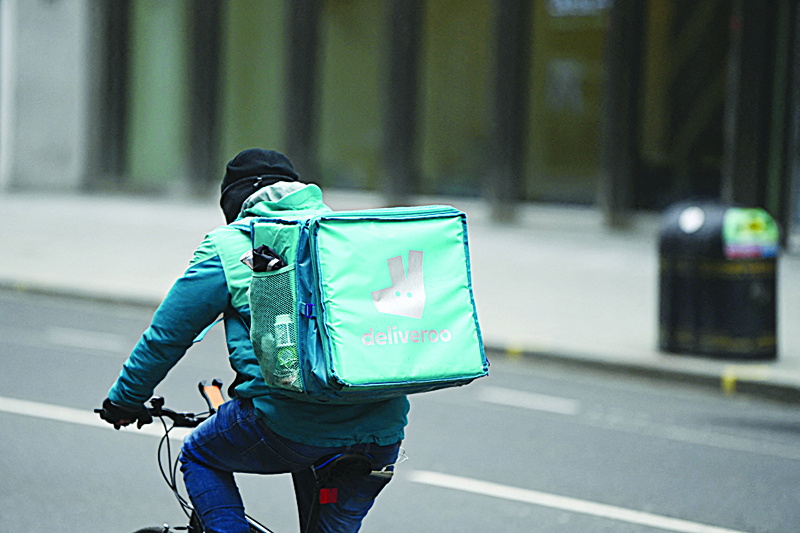 LONDON: A Deliveroo rider cycles through central London. Deliveroo shares slumped 15 percent at the start of its entry in the London stock market yesterday as the app-driven meals delivery group faces criticism over its treatment of riders. - AFP
LONDON: A Deliveroo rider cycles through central London. Deliveroo shares slumped 15 percent at the start of its entry in the London stock market yesterday as the app-driven meals delivery group faces criticism over its treatment of riders. - AFP
LONDON: Deliveroo shares slumped 23 percent as it launched on the London stock market yesterday, with the app-driven meals delivery group facing criticism over its treatment of riders. The Deliveroo IPO was London's biggest stock market launch for a decade, valuing the group at £7.6 billion ($10.4 billion, 8.9 billion euros), after the eight-year-old British company enjoyed surging sales during the coronavirus pandemic as locked-down people ordered in.
Deliveroo said earlier this week that it had seen "very significant demand from institutions across the globe", but some asset management firms decided against buying any shares, citing the job insecurity and conditions of its riders. It skidded on its market debut, with shares plunging to £3.02 after an initial public offering of £3.90 pence.
Trading opened down 15 percent before institutional investors-the first allowed to buy and sell Deliveroo shares-pushed down its price further. Deliveroo is selling just over one-fifth of the group, while the general public can start trading in its shares from April 7.
"I am very proud that Deliveroo is going public in London-our home," founder and chief executive Will Shu said in a statement ahead of the start of trading. "In this next phase of our journey as a public company we will continue to invest in the innovations that help restaurants and grocers to grow their businesses, to bring customers more choice than ever before, and to provide riders with more work."
Amazon-backed Deliveroo maintains that its riders-around 100,000 across 800 cities worldwide-value the flexibility the job affords. However, its business model has come under scrutiny, including in Britain, France and Spain, over conditions. The highly anticipated float has been overshadowed by small-scale protests, strikes and rallies in Australia, Britain and France, with more set to follow.
London boost
Deliveroo's listing is seen as a major boost to London's financial sector, known as the City, which earlier this year lost its European share trading crown to Amsterdam following Brexit. The stock market float is set to be London's largest since Swiss miner Glencore's IPO in 2011 valued at almost £37 billion.
Deliveroo has said that a portion of its stock is being made available for customers, with delivery riders and restaurant partners also able to participate. The company is adopting a dual class share structure, giving Shu 20 votes per share while all other shareholders get one vote per share.
"Concerns over working conditions for its riders were... cited as one of the reasons for the reluctance to invest," said Michael Hewson, chief market analyst at CMC Markets UK. However, he added, "there are probably a number of others, including the dual class structure which restricts the voting rights of ordinary shareholders and gives CEO Will Shu, majority control over any significant board decisions."
Hewson added that "recent weakness in the share price of a number of its peers in the US, like Doordash, appears to have taken some of the shine off the sector". Britain's antitrust regulator last year approved Amazon's 16-percent investment in Deliveroo after an in-depth probe concluded it would not harm competition. In 2020, more than six million people ordered food and drink every month via Deliveroo's app from 115,000 cafes, restaurants and stores.
But it still ended up with a hefty loss owing to rising costs. Pressure has meanwhile intensified on the wider "gig" economy to improve staff conditions after Uber earlier this month granted its UK drivers worker status, with benefits including a minimum wage. A world first for the US ride-hailing giant, Uber moved after Britain's Supreme Court ruled that its drivers were entitled to worker's rights. - AFP
.jpg)



